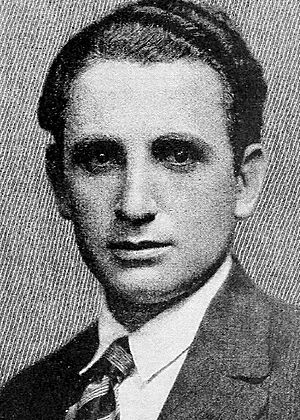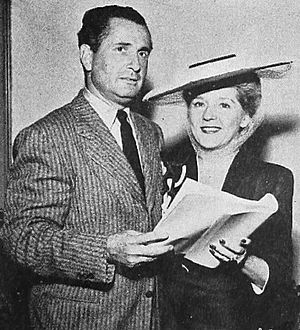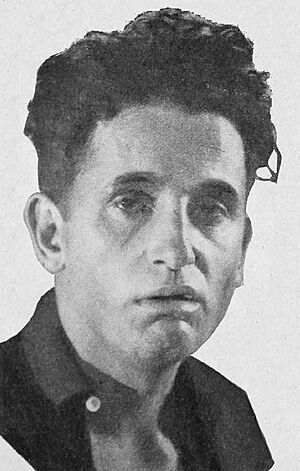Arthur Lubin facts for kids
Quick facts for kids
Arthur Lubin
|
|
|---|---|
 |
|
| Born |
Arthur William Lubovsky
July 25, 1898 Los Angeles, United States
|
| Died | May 11, 1995 (aged 96) Glendale, California, United States
|
| Resting place | Cremains scattered at sea |
| Occupation | Film director, writer |
Arthur Lubin (born July 25, 1898 – died May 11, 1995) was an American film director and producer. He was known for directing many popular movies. These included films starring the comedy duo Abbott & Costello. He also directed Phantom of the Opera in 1943.
Lubin was also behind the famous Francis the Talking Mule movie series. Later, he created the well-known TV show Mister Ed, about a talking horse. He worked a lot for Universal Pictures in the 1940s and 1950s. Many people remember him for giving actor Clint Eastwood his very first movie contract.
Contents
Early Life and First Steps in Acting
Arthur William Lubovsky was born in Los Angeles in 1898. His family moved to Jerome, Arizona, when he was five years old. Arthur loved acting from a young age. He performed in plays at his Sunday school. His mother encouraged him, but she passed away when he was six.
His family later moved to San Diego. In high school, Arthur managed the music and drama clubs. He felt that playing the main role in a play called The Vicar of Wakefield was very important for him. After school, he joined the San Diego Stock Company. He worked there for $12 a week. Famous actor Harold Lloyd was also part of this group.
As a child, Arthur helped touring theater groups. He also volunteered for circuses. He briefly joined the navy during World War One. After that, he studied drama at Carnegie Tech college. He earned money by moving scenery and props for plays. In 1922, he decided to become a professional actor.
Becoming an Actor
Arthur Lubin moved to New York to start his acting career. He appeared in several plays on stage. However, these plays were not very successful. So, he moved to Hollywood. There, he found roles in movies like His People. He also continued acting in plays.
In 1925, a newspaper called the Los Angeles Times said Lubin was "one of this year's juvenile screen sensations." He also started directing plays for the Hollywood Writers Club. As an actor, he often played serious, dramatic roles. This was very different from the comedies he would later direct.
He appeared in films such as The Woman on the Jury (1924) and Bardelys the Magnificent (1926). He also acted in The Wedding March (1928). One of his last acting roles was in Times Square (1929), an early movie with sound.
Over time, Lubin became more interested in directing. He felt he had a stronger personality on stage than in movies. He later said that acting experience helps directors. "You can talk their language," he explained. "You know the problems."
From Actor to Director
Early Directing in Theater and Film
Lubin returned to New York and started working in theater. He helped cast and direct plays. He then moved back to California. He tried acting again for a short time. But he soon decided to focus only on directing. He directed two plays at the Pasadena Playhouse. Later, he produced and directed them in New York.
He also worked for a film company called Ray-Minor. This job helped him get noticed by B.P. Schulberg, a studio boss at Paramount.
Directing at Paramount and Other Studios
In 1932, Lubin went to Hollywood to work for Paramount. He was an associate producer there. He also directed small theater productions in his free time. He became known for his "outstanding work." However, he was later let go from Paramount due to budget cuts.
Lubin then directed his first film, A Successful Failure (1934), for Monogram Pictures. He made several more films there. Then, he moved to Republic Pictures. He signed a contract to make six movies in a year. These included Two Sinners (1935) and The House of a Thousand Candles (1936). A magazine called Variety praised him. They said his fast work and low-budget films were great training.
Working at Universal Pictures
In 1936, Arthur Lubin signed a contract with Universal Pictures. His first film for them was Yellowstone (1936). He then directed several films starring a young John Wayne. These included California Crossing (1937) and Adventure's End (1937). Lubin said these films were shot very quickly. He became known for finishing movies fast and on time.
He directed more films for Universal, like Midnight Intruder (1938). He also made Black Friday (1940), a horror film with Boris Karloff and Bela Lugosi.
Directing Abbott and Costello
Lubin's career took a big leap when he directed the first movie starring the comedy duo Abbott and Costello. This film was Buck Privates (1941). It was a huge success, making $4 million. Lubin received a bonus for his work. He later said the success was mostly due to the comedians' amazing jokes.
He directed their next four movies: In the Navy (1941), Hold That Ghost (1941), Keep 'Em Flying (1942), and Ride 'Em Cowboy (1942). All these films were very popular. Variety magazine named Lubin the most successful director in Hollywood in 1941.
Lubin used two cameras when directing Abbott and Costello. One camera filmed both actors, and the other focused on Lou Costello. He said this was because the comedians often moved around. After five films, Lubin asked to work on other movies. He felt the duo were getting tired and complaining about scripts. But he said they taught him a lot about comedy timing. He also tried to make their routines a bit more refined.

More Universal Films and Independent Work
In 1942, Lubin directed a big war film called Eagle Squadron. It was a huge hit. This made him one of Universal's top directors. A newspaper article described him as an "easy boss" who was "friendly and witty." He liked to keep his actors relaxed.
He then made White Savage (1943). After that, he directed Phantom of the Opera (1943). This was his biggest budget film yet and was very successful. He also directed Ali Baba and the Forty Thieves (1944).
Lubin tried to join the military to make documentaries. But he was told he was more valuable making movies. He made Delightfully Dangerous (1945) for another studio. Back at Universal, he directed The Spider Woman Strikes Back (1946). He said he did not want to make this film. His next movie, Night in Paradise (1946), did not do well. Because of this, Universal did not renew his contract.
Francis the Talking Mule Series
After leaving Universal, Lubin made two more films for United Artists. These were New Orleans (1947) and Impact (1949).
Then, Lubin bought the rights to books about a talking mule named Francis. He brought the idea to Universal. The movie Francis (1950) was a huge hit. This led to a series of films, all directed by Lubin. He earned a percentage of the profits from these movies.
He also directed Rhubarb (1951) for Paramount. This movie was about a cat that inherited a baseball team. Lubin worried about becoming known only for animal movies. He joked, "Everyone seems to forget I once directed John Wayne."
He continued with the Francis series, making Francis Goes to West Point (1952) and Francis Covers the Big Town (1953). He also directed other films like It Grows on Trees (1952) and South Sea Woman (1953). He hoped to direct a suspense story to show he could direct people too.
After a film called Star of India (1954), he made Francis Joins the WACS (1954). He then directed the suspense film, which was called Footsteps in the Fog (1955). His last Francis movie was Francis in the Navy (1955). This film featured a young Clint Eastwood. Lubin had given Eastwood a personal contract. After Lady Godiva of Coventry (1955), Universal let Lubin go.
Later Films and Television Work
Clint Eastwood appeared in two more films Lubin made for his own company. These were The First Traveling Saleslady (1956) and Escapade in Japan (1957). In 1956, Eastwood signed a special three-year deal with Lubin.
Moving to Television
In the late 1950s, Arthur Lubin started working in television. He directed episodes of many TV shows. These included Westerns like Bronco (1958) and Maverick (1959). He also directed an episode of Bonanza (1960) and The Addams Family (1965).
Creating Mister Ed
Lubin's most famous TV work was Mister Ed. He wanted to make a TV show based on his Francis the Talking Mule movies. But he could not get the rights. Instead, he found short stories about a talking horse named Mr. Ed. He bought the rights to these stories in 1957.
A famous comedian, George Burns, helped pay for the first episode. But Lubin could not convince a TV network to buy the show. So, he decided to sell the show to local TV stations first. He found a sponsor and made 26 episodes. Eventually, the CBS network picked up the show. Mister Ed ran for six seasons and had 143 episodes.
Alan Young, who starred in Mister Ed, remembered Lubin as a "lovable character." He said Lubin liked to work quickly. Young also recalled a funny moment when Lubin told everyone, "Stop all this laughing! This is comedy, there's no time for laughter!"
Lubin was a longtime friend of actress Mae West. He even got her to appear in an episode of Mister Ed.
He also directed a few more movies. These included The Thief of Baghdad (1961) and The Incredible Mr. Limpet (1964). His last feature film was Rain for a Dusty Summer (1971). His final work was a TV special called Little Lulu in 1978. Arthur Lubin's career ended in the late 1970s.
Personal Life and Death
Arthur Lubin was gay and lived with his partner, Frank Burford, for many years.
He passed away at a nursing home in Glendale, California, on May 11, 1995. He was 96 years old.
Filmography
As director or producer
- A Successful Failure (1934)
- Great God Gold (1935)
- Honeymoon Limited (1935)
- Two Sinners (1935)
- Frisco Waterfront (1935)
- The House of a Thousand Candles (1936)
- Yellowstone (1936)
- Mysterious Crossing (1936)
- California Straight Ahead! (1937)
- I Cover the War (1937)
- Idol of the Crowds (1937)
- Adventure's End (1937)
- Midnight Intruder (1938)
- The Beloved Brat (1938)
- Prison Break (1938)
- Secrets of a Nurse (1938)
- Newsboys' Home (1938)
- Risky Business (1939)
- Big Town Czar (1939)
- Mickey the Kid (1939)
- Call a Messenger (1939)
- The Big Guy (1939)
- Black Friday (1940)
- Gangs of Chicago (1940)
- Meet the Wildcat (1940)
- I'm Nobody's Sweetheart Now (1940)
- Who Killed Aunt Maggie? (1940)
- The San Francisco Docks (1940)
- Where Did You Get That Girl? (1941)
- Buck Privates (1941)
- In the Navy (1941)
- Hold That Ghost (1941)
- Keep 'Em Flying (1941)
- Ride 'Em Cowboy (1942)
- Eagle Squadron (1942)
- Keeping Fit (1942) (short)
- To the People of the United States (1943)
- White Savage (1943)
- Phantom of the Opera (1943)
- Ali Baba and the Forty Thieves (1944)
- Delightfully Dangerous (1945)
- The Spider Woman Strikes Back (1946)
- Night in Paradise (1946)
- New Orleans (1947)
- Impact (1949)
- Francis (1950)
- Francis Goes to the Races (1951)
- Queen for a Day (1951)
- Rhubarb (1951)
- Francis Goes to West Point (1952)
- It Grows on Trees (1952)
- Gobs in a Mess (1953) – short
- South Sea Woman (1953)
- Francis Covers the Big Town (1953)
- Star of India (1954)
- Francis Joins the WACS (1954)
- Footsteps in the Fog (1955)
- Francis in the Navy (1955)
- Lady Godiva of Coventry (1955)
- The First Traveling Saleslady (1956) – also producer
- Escapade in Japan (1957) – also producer
- The Thief of Baghdad (1961)
- The Incredible Mr. Limpet (1964)
- Hold On! (1966)
- Mister Terrific (1967)
- Rain for a Dusty Summer (1971)
As actor
- The Woman on the Jury (1924)
- His People (1925)
- Bardelys the Magnificent (1926)
- Millionaires (1926)
- Afraid to Love (1927)
- The Wedding March (1928)
- The Bushranger (1928)
- Eyes of the Underworld (1929)
- Times Square (1929)
Partial TV credits
- The Ed Wynn Show (1958)
- Westinghouse Desilu Playhouse (1959) – "The Comeback"
- Bronco (1959)
- 77 Sunset Strip (1959)
- The Deputy (1959–60)
- Maverick (1959–60)
- The Alaskans (1960)
- Cheyenne (1960)
- Lawman (1960)
- New Comedy Showcase (1960)
- Bonanza (1960)
- Mister Ed (1961–66) – also producer
- The Addams Family (1965)
- The Double Life of Henry Phyfe (1966)
- The Pruitts of Southampton (1967)
- Mr. Terrific (1967)
- ABC Weekend Specials (1978–81) – "If I'm lost, How Come I Found You?" (1978), "Little Lulu" (1978), "Arthur the Kid" (1981)
See Also
 In Spanish: Arthur Lubin para niños
In Spanish: Arthur Lubin para niños
 | Bayard Rustin |
 | Jeannette Carter |
 | Jeremiah A. Brown |


